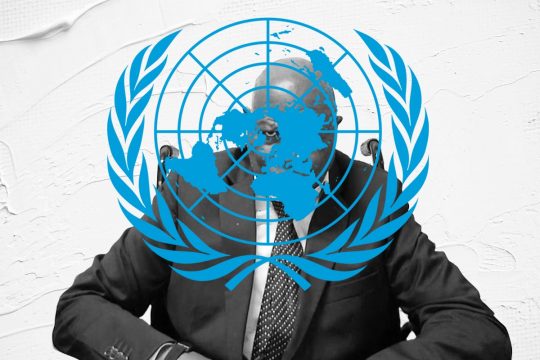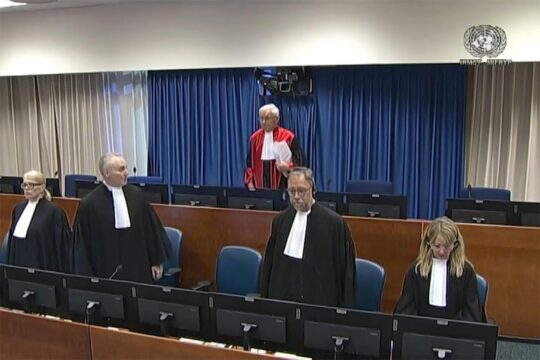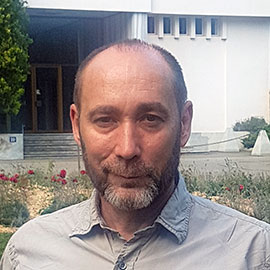It's a decision without precedent in international courts, or even beyond. In a ruling made public on June 6, judges of the International Mechanism tasked with the residual functions of international tribunals (UN tribunals for the former Yugoslavia and Rwanda) agreed by a majority that Félicien Kabuga, the former Rwandan businessman accused of playing a key role in the 1994 genocide, was no longer capable of participating in his trial.
But instead of suspending the trial, as other international tribunals have done in such circumstances, they want an "alternative procedure" to continue trying him while not passing sentence.
“Mr. Kabuga's health and his fitness for trial have been central issues in these proceedings from the outset,” the trial judges recognized in their decision. Kabuga was arrested just over three years ago in France. As soon as he was transferred in October 2020 to the Mechanism's headquarters in The Hague, two psychiatrists, Henry Kennedy and Gillian Mezey, examined the then 85-year-old (87 according to him) ailing defendant. A year ago, Professor Mezey already considered Kabuga unfit to stand trial, but Professor Kennedy thought the opposite. He deemed that the old man was not yet suffering from senile dementia. The court therefore decided to open the trial on September 29, 2022, while arranging for his state of health to be monitored by the two psychiatrists, joined by neurologist Patrick Cras.
But on December 12, the experts’ report was alarming. “The three Experts agreed that there was evidence of vascular disease affecting Mr. Kabuga's brain and of previous cerebrovascular accidents, and that he had significant deficits in short-term memory, complex decision making, attention and concentration, reasoning and judgment, executive functioning, and communication,” the court announced. “He also exhibited fluctuations in mood and personality change. While the Experts expressed different views regarding some of Mr. Kabuga's capacities related to fitness, they agreed that he was not able to understand the course of proceedings or details of the evidence and that he would be unable to testify, even with assistance."
Kabuga was no longer fit to stand trial. The experts recommended a new examination within three months. The prosecutor wanted to continue the proceedings "in the interests of justice", but the defence asked for the proceedings to be halted and Kabuga to be released.
The judges rejected this request.
Kabuga deemed unfit
During the first three months of the trial, the chamber was able to sit 29 days - two hours a day, three days a week - and hear 19 prosecution witnesses, mainly behind closed doors. Kabuga was present at 18 hearings, video-linked on three occasions, and absent eight times. The trial was scheduled to resume on January 17. It was postponed several times due to the accused's state of health. From February 14 to March 2, the court sat again and heard four witnesses over six days.
That was until the new report of the three experts, who were unanimous in their conclusion that “Kabuga's physical health and mental capacities have deteriorated significantly since their previous assessments, that he now meets the clinical criteria for dementia, and that he cannot meaningfully participate in his trial regardless of trial modalities or accommodations”, the court said.
To declare the accused fit or unfit to stand trial, the Chamber applied a test established by the Tribunal for the former Yugoslavia. It comprises seven criteria: capacity to (i) plead; (ii) understand the nature of the charges; (iii) understand the course of the proceedings; (iv) understand the details of the evidence; (v) instruct counsel; (vi) understand the consequences of the proceedings; and (vii) testify. For the experts, Kabuga has a "superficial" capacity for three of these, and is no longer in possession of four others: understanding the course of the proceedings, understanding the evidence, giving instructions to his lawyer and testifying. His “limited ability to communicate does not enable Mr. Kabuga to participate meaningfully in his trial as such participation would require a higher level of cognitive function than he possesses”, they said. The doctors also considered it unlikely that Kabuga could be faking illness.
In their June 6 decision, the majority of judges found that Kabuga “is no longer capable of meaningful participation in his trial”. It was a victory for the defence.
Judge El Baaj disagrees
As for the prosecution, it can take some consolation from the dissenting opinion of Moroccan judge Mustapha el Baaj. In his view, the defence has not "made a legal demonstration" that Kabuga is unfit. He considers the expert report issued in March to be "superficial and incomplete". “The determination of the fitness to stand trial is not a mere addition of the capacities an accused has, or does not have. On the contrary, I consider that the relevant standard requires an assessment of an ‘overall capacity allowing for a meaningful participation in the trial’, provided that he is duly represented by counsel.” And for him, this criterion is met. Drawing on case law from a former UN tribunal in East Timor, he points out that "a court need not determine whether the individual operates at the highest level of functioning. Rather, the test is whether the defendant satisfied certain minimum requirements. Additionally, some common law jurisdictions explicitly recognize that insanity or amnesia alone is not enough to conclude that a person is unfit to stand trial”.
Judge El Baaj also rejects the experts' conclusion that Kabuga's illness is irreversible. He cites, for example, the fact that Kabuga sometimes waived his right to be present at hearings when he was requesting dismissal of his lawyer, only to attend each hearing once this request had been rejected by the court. “This constitutes, in my opinion, an indication of Kabuga's capacity to understand the course of the proceedings,” he writes.
According to him, the prosecution has already presented around half of the prosecution witnesses expected, and the defence has had time to establish its strategy. He submits that international law has changed over the last two decades with regard to disabled defendants, and that "a declaration of unfitness in itself, when the accused still has the ability to express his will and preference, amounts to denying to a discernible person his or her humanity, in reducing him or her as a mere object in the room”.
So, according to El Baaj, Kabuga's rights are violated by declaring him unfit, even though it is his lawyers who are requesting this on his behalf.
Interests of the accused, the victims or the Mechanism?
Indeed, it seems everyone has the interests of the accused so much at heart that protecting them means, on one point or another, going against his will or that of his lawyers.
But what can be done once the accused is no longer fit to answer the charges brought against him? It turns out that neither the prosecutor nor the judges want to stop the judicial machine. After a final verdict on May 31 concerning the former Yugoslavia, Kabuga is the Mechanism's last trial. Salaries and careers are at stake. Fortunately, the prosecutor has proposed an "alternative procedure": a "review of the facts". According to him, this is "a superior way of respecting Mr. Kabuga's rights and effectuating the goals for which the Mechanism was established". And the same two judges who declared Kabuga unfit to stand trial - Iain Bonomy of the UK and Margaret M. deGuzman of the US - agree that "respect for Mr. Kabuga's rights supports adopting an alternative procedure rather than staying the proceedings without providing him any opportunity for exoneration and unconditional release”.
The Chamber identifies three options in the situation where an accused is declared unfit: staying proceedings, simply suspending them, or conducting alternative proceedings. It observes that no international tribunal has opted to stay proceedings, and notes that the only precedent truly comparable to the Kabuga case is that of Ieng Thirith, a former Khmer Rouge minister in Pol Pot's government in Cambodia. Deemed to be suffering from senile dementia just before the start of her trial, her case was suspended. Less than a year later, as her illness was considered irreversible, she was released and died three years later at home.
But for the Chamber, the Kabuga case is "different". “Staying proceedings in this case is not the best way to effectuate the goals of the Mechanism, including combating impunity and contributing to the restoration and maintenance of peace in Rwanda,” it said. “Such a stay would leave victims and survivors without any findings in relation to allegations of conduct attributed to Mr. Kabuga. Finally, the Trial Chamber notes that Mr. Kabuga's decision to evade justice for more than two decades resulted in the present situation, making it particularly unfair to privilege his preference for termination or stay of proceedings over the needs of victims and survivors. There is a strong public interest in the conduct of proceedings against persons accused of serious international crimes.”
A very alternative procedure
As no international tribunal has ever planned or organized such an alternative procedure, judges had to look elsewhere for examples. They seem to be few and far between, and also have a number of shortcomings: they refrain from passing sentence, and they deal only with the guilty act (actus reus), not with criminal intent (mens rea). This poses a problem when dealing with crimes against humanity, particularly genocide, where the perpetrator's intent is central. The judges of the Mechanism accept that they cannot convict, but are reluctant not to be able to assess criminal intent.
So they needed to be innovative. "Many of the charges against Mr. Kabuga hinge on his mental state. To limit the alternative procedure to a finding of facts would deny Mr. Kabuga significant lines of defence and opportunities for acquittal. Moreover, the Prosecution has agreed that it should be required to prove mens rea, as well as actus reus, and to do so beyond all reasonable doubt. (…) Because Mr. Kabuga is very unlikely to regain fitness, the best way to ensure respect for his rights and effectuate the goals of the Mechanism is to adopt an alternative finding procedure that resembles a trial as closely as possible, but without the possibility of a conviction," conclude the two judges.
And so the miracle happened. Kabuga's presence is no longer deemed necessary. He will no longer be asked to attend. It is no longer necessary to limit the number of hearing days. This will resemble a criminal trial, but without formal punishment. It seems agreed that a "non-acquittal" could be pronounced.
Judge El Baaj still disagrees
It's a victory for the prosecutor. For the defence, there is no legal basis for such a procedure, which "would amount to an abuse of discretionary power and violate the principle of legality".
And it was Kabuga's lawyers who, this time, could take comfort in the dissenting opinion of Judge el Baaj, who decidedly disagreed on everything. "The procedure proposed by the Majority is based on a vague and ambiguous concept", writes the dissenting judge, for whom such an undertaking "entails grave breaches to the fundamental rights of the Accused, including his right to be present and to defend himself, as well as his right against arbitrary detention, and does not have any basis in the legal framework of the Mechanism, namely its Statute, Rules and jurisprudence". In his view, the Chamber is committing an abuse of the law by resorting to this alternative, which violates the principle of legality and the principle of equality. What's more, this does not fit into the fight against impunity "since such procedures, in removing any possibility of conviction and consequently of punitive sanction, are being deprived of their criminal nature".
He writes that “less than ten countries around the world, and only from the common-law tradition, adopted procedures comparable to an alternative finding procedure”, and that this cannot therefore constitute a general principle of law. In his view, such a procedure is even in direct violation of the Mechanism's code of procedure. Furthermore, "the issue of Kabuga's hypothetical detention if a verdict of 'non- acquittal' were to be reached is also an unknown."
Appeal pending
"I am of the view that the public interest and general objectives such as peace and reconciliation cannot justify the implementation of such innovative criminal procedure", concludes Judge el Baaj. For him, the jurisprudence of international tribunals is clear: if the accused is unfit, the proceedings are suspended.
His opinion therefore reads like a perfect draft of the appeal that the defence is sure to file. Kabuga's lawyers have a week to do so, and the Chamber already seems to have anticipated the move by declaring that the "trial" can only resume once this right of appeal has been exhausted. By the time a final decision is reached, the three medical experts will no doubt have delivered their new report on Kabuga's state of health, due in September.








